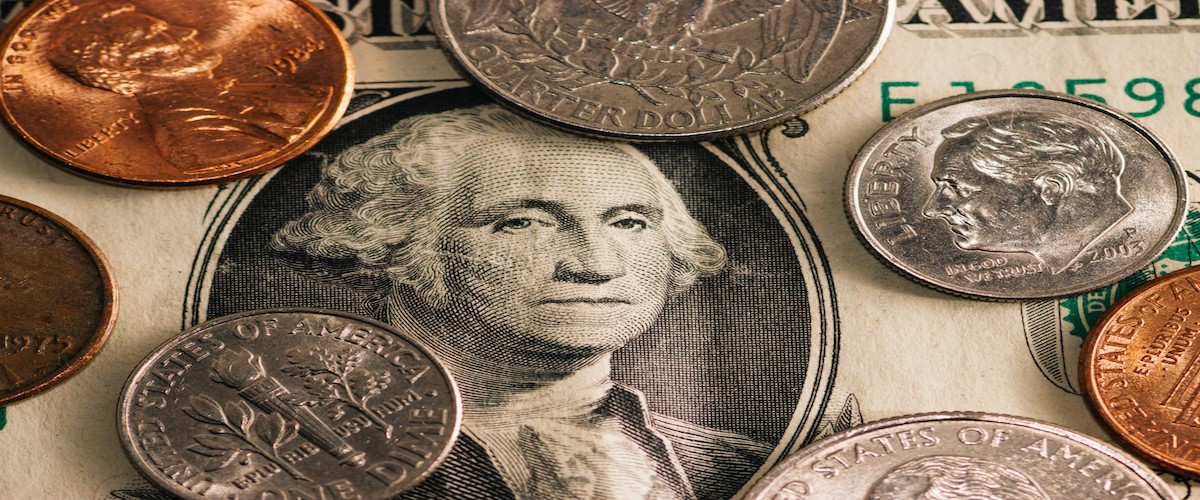The dollar takes a dive: What that means for your pocket
The value of the U.S. dollar is plummeting, raising concerns about its effects on economic growth.
The dollar began depreciating in 2017, when it fell 10 percent, followed by another 1.5 percent decline so far this year. The phenomenon has baffled economists, who predicted the dollar would appreciate given the Federal Reserve's decision to raise interest rates three times last year and the economy's accelerated growth.
The strength of the dollar is judged against currencies from other countries, such as the pound, euro or yen. It's considered weak when it buys less than its equivalent in another currency — i.e., it purchases less of a foreign country's goods or services. By Thursday, it was trading down 0.1 percent against other major currencies at about 89.07, according to CNBC.
The descent is staggering because the stock market is hitting almost daily record highs and yields on the 10-year Treasury, one of the most significant indicators of mortgage rate activity, have reached their highest levels in three years. Typically, those circumstances would strengthen the dollar but they're not.

This week, Treasury Secretary Steven Mnuchin said a weakened dollar benefits the economy because of its effect on international trade. Those comments set off another dollar nosedive as the greenback hit a three-year low on Wednesday, its biggest one-day drop in 10 months.
A day later, Mnuchin, who was speaking at the World Economic Forum in Switzerland, walked back his comments, saying he wasn't concerned about dollar weakness in the short term. He stressed that the Trump administration believes in the dollar's long-term strength. President Donald Trump later said Mnuchin's comments were misinterpreted and that the dollar would strengthen under his leadership.
Before taking office, Trump decried a strong dollar as damaging to the U.S. economy. A strong dollar boosts Americans' spending power and makes it cheaper to buy goods from foreign countries. That sounds like a good thing but it has a drawback — a strong dollar makes U.S. exports more expensive, ultimately jeopardizing America's standing in the global marketplace.
A weaker dollar, on the other hand, makes U.S. goods and services cheaper to buy, which boosts demand overseas and makes American exports more competitive in the global market. That, in turn, increases the nation's gross domestic product and potentially results in a rise in inflation, which has been relatively sluggish over the past several years.
But like a strong dollar, a weak one has downsides:
- Production costs increase: A weak dollar makes it more costly for U.S. manufacturers to produce and ship goods at home. That could motivate corporations to outsource to other countries and keep wages stagnant.
- Consumers get hit: Companies absorbing weak dollar-driven price hikes eventually would pass those higher costs to consumers. That could generate higher inflation which, over time, strains the purchasing power of consumers.
- Commodities soar: A weak dollar pushes up the price of commodities — particularly gas, which is traded in U.S. dollars.
- Luxuries become more exorbitant: Enjoy your wine imported from France, or your purse from Milan? A weak dollar will make it more expensive to buy those luxuries. It'd also make it more costly to travel overseas.
Why is the dollar dropping?

There are three possible reasons:
- A strong Europe: Europe's economic growth has exceeded expectations, despite disruptions such as the French elections and the Catalonia referendum in Spain which granted the region statehood. Brexit's economic and fiscal impact have been delayed. And the forging of a potential partnership between French President Emmanuel Macron and German Prime Minister Angela Merkel has raised hopes of stronger economic leadership on the continent. Those three things together have encouraged markets on the behavior of the euro and the vitality of the European economy.
- Tax reform: Trump's comprehensive tax reform plan has excited some investors but it's also expected to increase the national debt by $20 trillion. That's pushed the value of the dollar lower, although it initially gained on expectations that a border tax would increase U.S. tax receipts.
- High oil prices: As we discussed last week, oil prices have risen to their highest level since December 2014. The dollar and commodities, such as oil, have an inverse relationship. When the dollar falls, other currencies become stronger, meaning investors in other countries can buy more oil in their own currency. That drives up demand, which propels fuel prices.
Fourth-quarter growth slows
The U.S. economy expanded slower than economists expected in the fourth quarter, with gross domestic product growing by only 2.6 percent, the Commerce Department said on Friday. That fell short of expectations that it would grow by 3 percent in the final quarter of 2017.
Although the economy grew far quicker and stronger in 2017 than in the year before, the last quarter's tempered activity poses a challenge to Trump's vow of 3-percent economic growth under his tenure. Fourth-quarter GDP slowed mainly because the trade deficit increased, Bloomberg reports.
Still, Trump's tax reform plan is expected to give the economy an additional boost this year. And while GDP was somewhat disappointing, consumer spending, which comprises the largest sector of the economy, increased 3.8 percent.
Earlier this week, the International Monetary Fund this week revised its outlook for the world economy, forecasting global growth of 3.7 percent for 2017 based on economic growth from 120 countries. As for the U.S., the IMF expects U.S. tax cuts to give the economy a short-term boost, and growth to escalate by 2.7 percent this year, up from 2.3 percent in 2017.
In other mortgage news…
- By a 84-13 vote, the Senate on Tuesday confirmed Jerome Powell's nomination as the next chair of the Federal Reserve. Powell, a former Fed governor, will take over after current Chair Janet Yellen's term ends in February.
- Mortgage applications increased 5 percent from last week despite interest rates rising to their highest level in nearly a year.
- Existing-home sales rose just over 1 percent in 2017 to 5.51 million sales — the biggest boost since 2006 — despite a weak December that ended two straight months of increases.
- New home sales last year increased to their highest level since 2007. Data from the U.S. Census Bureau and HUD shows home sales increased 8.3 percent, from 561,000 in 2016 to 608,000 last year.


